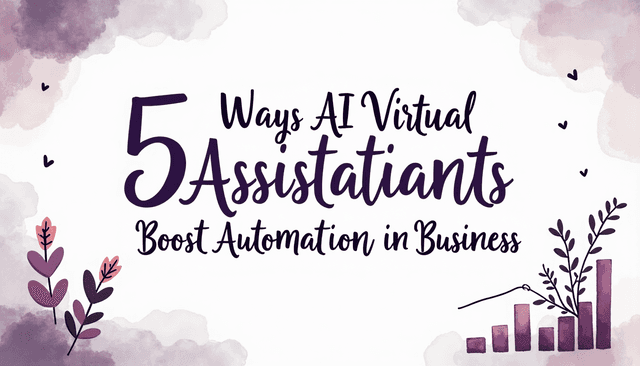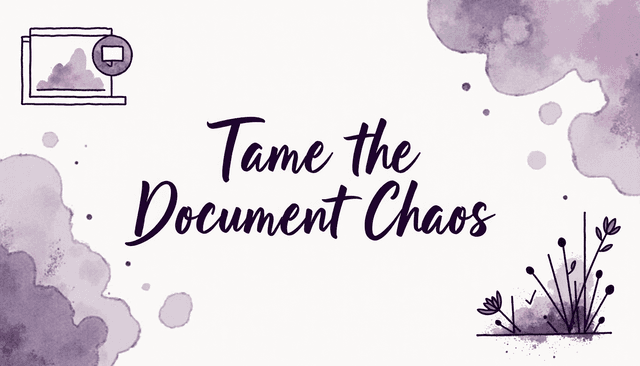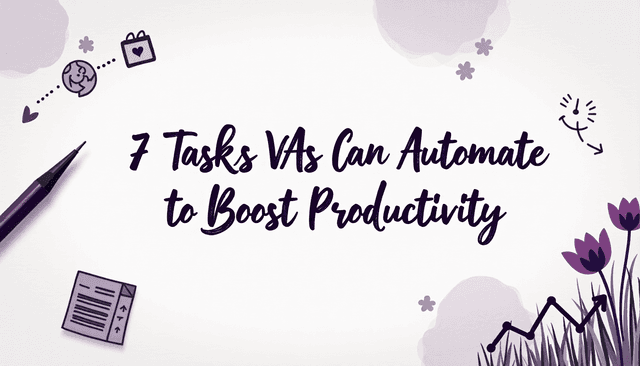Hot Topic for VAs in 2024: AI Integration and Digital Transformation
September 28, 2024 • 9 min read
Discover how AI is transforming the virtual assistance industry, offering new opportunities for efficiency, specialization, and enhanced client services in 2024 and beyond.

Virtual Assistants, get ready for a game-changer! Artificial Intelligence (AI) is reshaping our industry, offering exciting opportunities to boost your efficiency and expand your services in the world of virtual assistance technology.
Here's what's buzzing in the AI-powered virtual assistant landscape:
-
Smart Task Automation: AI tools are taking over routine tasks, freeing you up for high-value work. Imagine software that sorts emails, schedules appointments, and even drafts responses – all without your input, enhancing your virtual assistance capabilities!
-
Enhanced Client Services: With AI-powered analytics, you can offer data-driven insights to your clients. For example, you could use AI to analyze social media trends and suggest content strategies, elevating your role as a strategic partner.
-
Skill Expansion: AI is opening doors to new specializations in virtual assistance. Virtual Assistants who master AI tools for content creation, market research, or customer service chatbots are in high demand, showcasing the evolving nature of VA services.
-
Personalized Customer Experiences: AI helps tailor interactions to individual clients. Think of AI-driven CRM systems that predict client needs based on past behavior, allowing you to provide more personalized virtual assistance.
While AI brings exciting possibilities, it's not about replacing VAs – it's about empowering us. By embracing these tools, you can take on more clients, offer premium services, and focus on tasks that truly need the human touch in the digital age.
Ready to ride the AI wave in virtual assistance? Start exploring AI tools that align with your services. The future of virtual assistance is here, and it's smarter than ever!
AI is the hot topic for VAs in 2024. AI integration enables smart task automation, enhanced client services, skill expansion, and personalized customer experiences. By leveraging AI tools, VAs can boost efficiency, offer premium services, and focus on high-value work while adapting to the evolving landscape of virtual assistance and digital transformation.

Introduction to AI-Powered Virtual Assistance
Virtual assistance has evolved rapidly in the past six months, reshaping how businesses operate in the digital realm. As a VA or small business owner, staying ahead of these trends in AI and virtual assistance is crucial for success.
AI integration is transforming the VA landscape, ushering in a new era of digital transformation. Tools now offer intelligent chat support and document summarization, allowing VAs to handle more complex tasks efficiently. For example, an AI-powered virtual assistant can now manage customer inquiries for multiple clients simultaneously, thanks to advanced chatbots.
Specialization is becoming a key differentiator in the virtual assistance industry. VAs with niche skills in digital marketing, data analytics, or IT support are in high demand. A VA specializing in social media management, for instance, can command higher rates and attract clients looking for expertise in this area of digital transformation.
Remote work support has become a core VA function in the age of digital workspaces. As businesses adapt to distributed teams, VAs play a crucial role in facilitating smooth operations. This includes managing virtual meetings, coordinating team schedules across time zones, and ensuring effective communication in the digital environment.
Data security and privacy have taken center stage in virtual assistance. With the increase in remote work, VAs must be vigilant about protecting sensitive information. This might involve using secure file-sharing platforms and implementing strict data handling protocols in the digital realm.
These trends highlight the dynamic nature of virtual assistance, emphasizing the need for continuous learning and adaptation in our field as we embrace AI and digital transformation.
AI is everywhere in Virtual Assistance
AI has become a game-changer for virtual assistants and small businesses alike. Here's how AI is revolutionizing virtual assistance:
-
Smarter VAs: AI integration is boosting VA capabilities. Imagine an AI-powered virtual assistant that can summarize lengthy documents in seconds or transcribe client calls accurately13. This frees up time for more strategic tasks in virtual assistance.
-
Niche Expertise: The demand for specialized VAs is soaring. If you're skilled in digital marketing or data analytics, you're in luck12. Businesses are seeking VAs who can bring unique expertise to the table in the age of AI.
-
Remote Work Champions: VAs are now the backbone of remote teams. They're mastering tools like Zoom and Slack to keep distributed teams connected and productive2, showcasing the importance of virtual assistance in digital workspaces.
-
Data Guardians: With remote work on the rise, VAs are becoming data security experts. They're learning to protect sensitive information in the digital workspace1, a crucial aspect of modern virtual assistance.
-
Voice Assistants at Work: "Hey Siri, schedule a meeting with the team." Voice-activated assistants are making their way into business operations, streamlining daily tasks1 and complementing human virtual assistants.
AI is not replacing VAs; it's empowering them. By embracing these trends in AI and virtual assistance, VAs can offer more value, command higher rates, and stay ahead in a competitive market. The future of virtual assistance is here, and it's powered by AI and digital transformation.

Conclusions: Embracing the Future of AI-Powered Virtual Assistance
The virtual assistance landscape is evolving rapidly, offering exciting opportunities for VAs, business owners, and entrepreneurs alike. Let's recap the key trends shaping our industry in the age of AI and digital transformation:
-
AI Integration: AI is no longer just a buzzword in virtual assistance. It's a powerful tool that's helping VAs work smarter, not harder. From chatbots to data analysis, AI is boosting productivity and expanding service offerings in the virtual assistance realm.
-
Specialization is Key: Gone are the days of the jack-of-all-trades VA. Clients now seek experts in specific fields like digital marketing or IT support. Finding your niche can set you apart in a crowded market of AI-powered virtual assistants.
-
Remote Work Champions: VAs are at the forefront of the remote work revolution, helping businesses adapt to distributed teams and new collaboration tools in the digital workspace.
-
Data Security Focus: With great power comes great responsibility in virtual assistance. As VAs handle more sensitive information, prioritizing data security is crucial for building trust and compliance in the digital age.
-
Personalization at Scale: Thanks to AI and automation, VAs can now offer personalized services to more clients without sacrificing quality, showcasing the power of AI in virtual assistance.
These trends point to a future where VAs are not just support staff, but strategic partners in business growth and digital transformation. By embracing these changes and continuously upskilling in AI and virtual assistance technologies, VAs and VA businesses can thrive in this dynamic environment.
Remember, adaptability is your superpower in the world of AI-powered virtual assistance. Stay curious, keep learning, and you'll be well-positioned to ride the wave of innovation in virtual assistance and digital transformation.
Ready to supercharge your VA business with AI? Sign up for PreAdmin.pro's waiting list and get a serious discount on our game-changing platform!
Frequently Asked Questions about AI and Virtual Assistance
How can I start integrating AI into my virtual assistant business?
To start integrating AI into your VA business, begin by exploring AI tools that align with your current services. Look for AI-powered software for task automation, email management, or data analysis. Start small by implementing one or two tools, and gradually expand as you become more comfortable with AI in virtual assistance. Consider taking online courses or workshops on AI for business to deepen your understanding and stay updated on the latest developments in AI-powered virtual assistance. For more insights on essential tools for VAs, including AI-powered options, check out our guide on essential tools for virtual assistants.
What are some potential risks or challenges of using AI in virtual assistance?
While AI offers many benefits to virtual assistance, there are potential challenges to consider. These include data privacy concerns, the need for continuous learning to keep up with rapidly evolving AI technologies, and the initial investment in AI tools and training for virtual assistants. There's also the risk of over-reliance on AI, potentially diminishing the human touch that many clients value in virtual assistance. It's important to strike a balance between AI efficiency and maintaining personal connections with clients in the virtual assistance industry.
How can I specialize as a VA to stay competitive in the changing market of AI-powered virtual assistance?
To specialize as a VA in the age of AI, start by identifying your strengths and interests, then align them with market demands in virtual assistance. Consider areas like digital marketing, data analytics, or IT support, which are mentioned as high-demand fields in AI-powered virtual assistance. Invest in relevant training or certifications to build expertise in your chosen niche of virtual assistance. Develop a portfolio showcasing your specialized skills in AI and virtual assistance, and target clients or industries that specifically need your expertise. Continuously update your knowledge to stay ahead in your specialized field of AI-powered virtual assistance. If you're just starting out, our guide on how to become a virtual assistant can provide valuable insights.
What steps can I take to ensure data security when working as a virtual assistant in the AI era?
To ensure data security as a VA in the age of AI, implement these measures: Use secure, encrypted file-sharing platforms for all client data transfers. Employ strong, unique passwords for all accounts and consider using a password manager. Enable two-factor authentication wherever possible. Keep your software and operating systems updated. Use a VPN when working on public Wi-Fi networks. Develop and follow strict data handling protocols, including secure disposal of sensitive information. Regularly educate yourself on the latest cybersecurity best practices and consider obtaining relevant certifications to demonstrate your commitment to data security in virtual assistance.
How can AI help me offer more personalized services to my clients in virtual assistance?
AI can significantly enhance personalization in your VA services. Use AI-powered CRM systems to analyze client behavior and predict their needs in virtual assistance. Implement AI chatbots to provide instant, personalized responses to client queries. Utilize AI tools for data analysis to offer tailored insights and recommendations as part of your virtual assistance services. AI can also help in creating personalized content for each client's audience. By leveraging these AI capabilities, you can offer more customized experiences at scale, increasing the value you provide to each client without significantly increasing your workload in virtual assistance. To learn more about maximizing your earnings as a VA, including through personalized services, check out our article on maximizing earnings with packages.



